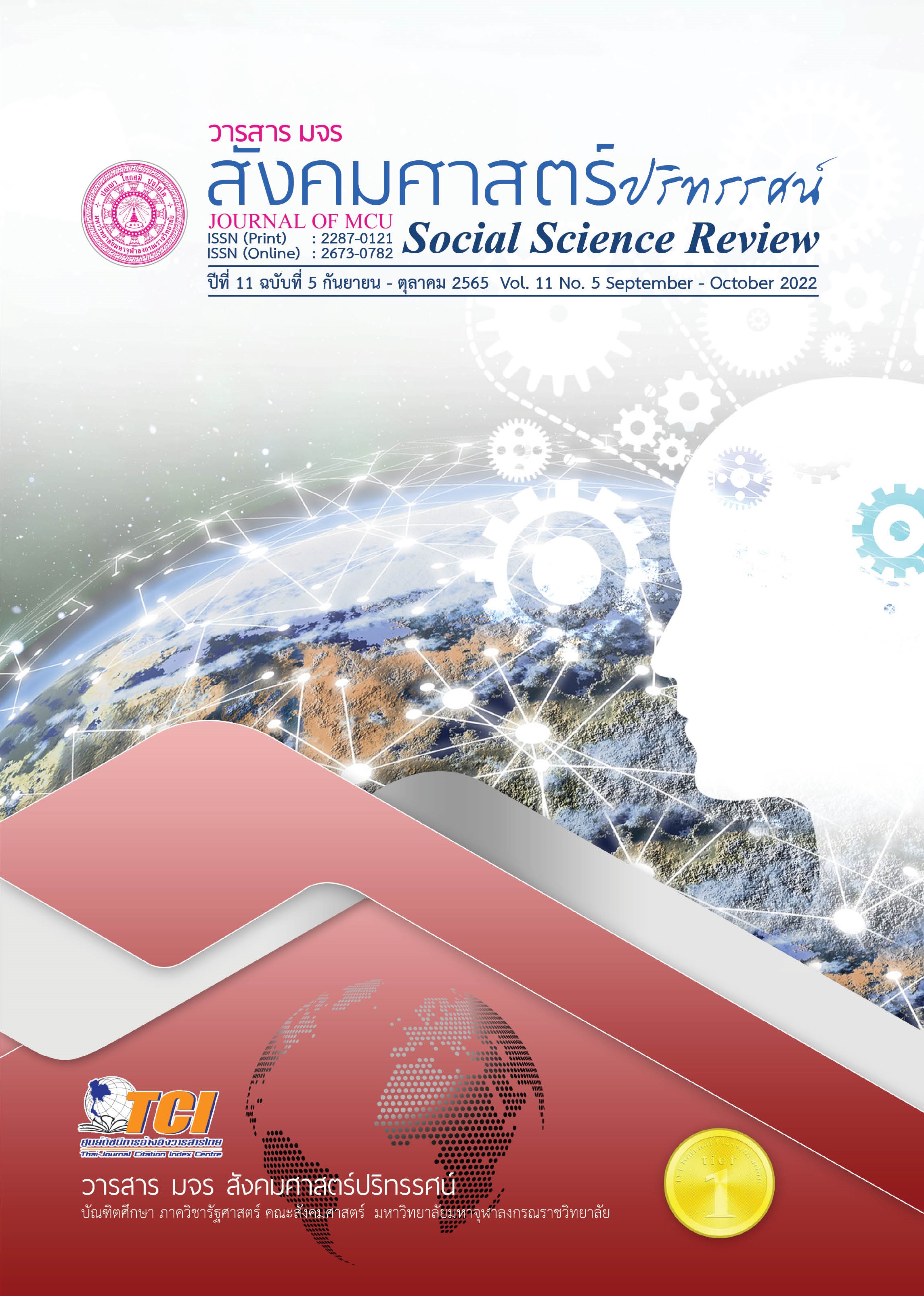โมเดลความสัมพันธ์ระหว่างภาวะผู้นำเชิงนวัตกรรม วัฒนธรรมองค์การ และประสิทธิผลองค์การของการไฟฟ้าฝ่ายผลิตแห่งประเทศไทย
คำสำคัญ:
ภาวะผู้นำเชิงนวัตกรรม, วัฒนธรรมองค์การ, ประสิทธิผลองค์การบทคัดย่อ
การวิจัยครั้งนี้มีวัตถุประสงค์เพื่อศึกษาโมเดลความสัมพันธ์ ใช้ระเบียบวิธีวิจัยเชิงพรรณนา โดยการวิจัยเชิงสำรวจ กลุ่มตัวอย่างคือ ผู้บริหารของการไฟฟ้าฝ่ายผลิตแห่งประเทศไทย จำนวน 316 คน จากจำนวนประชากร จำนวน 1,427 คน ใช้วิธีสุ่มตัวอย่างแบบง่าย เครื่องมือที่ใช้ในการวิจัยคือ แบบสอบถามเป็นแบบมาตราส่วนประเมินค่า 5 ระดับ ค่าความเชื่อมั่นของแบบสอบถามการวิจัยแสดงด้วยค่าสัมประสิทธิ์แอลฟาของครอนบาคเท่ากับ 0.974 สถิติที่ใช้ในการวิเคราะห์ข้อมูลประกอบด้วย ค่าความถี่ ค่าร้อยละ ค่าเฉลี่ย ส่วนเบี่ยงเบนมาตรฐาน การวิเคราะห์โมเดลสมการโครงสร้างและการวิเคราะห์เส้นทาง
ผลการวิจัย พบว่า ภาวะผู้นำเชิงนวัตกรรม วัฒนธรรมองค์การและประสิทธิผลองค์การของการไฟฟ้าฝ่ายผลิตแห่งประเทศไทยมีความสัมพันธ์กัน และความสอดคล้องกับข้อมูลเชิงประจักษ์ (χ2=365.146, df=302, p-value=0.21, χ2/df =1.21, GFI= 0.91, AGFI=0.97, RMSEA= 0.03, RMR=0.01, CFI= 0.99) โดยภาวะผู้นำเชิงนวัตกรรมมีอิทธิพลทางตรงต่อวัฒนธรรมองค์การ (β = 0.60,p-value < .05) และมีอิทธิพลทางตรงต่อประสิทธิผลองค์การของการไฟฟ้าฝ่ายผลิตแห่งประเทศไทย (β = 0.43, p-value < .05) วัฒนธรรมองค์การมีอิทธิพลทางตรงต่อประสิทธิผลองค์การของการไฟฟ้าฝ่ายผลิตแห่งประเทศไทย (β =0.61, p-value < .05) และภาวะผู้นำเชิงนวัตกรรมมีอิทธิพลทางอ้อมต่อประสิทธิผลองค์การของการไฟฟ้าฝ่ายผลิตแห่งประเทศไทยโดยผ่านวัฒนธรรมองค์การ (β =0.71, p-value < .05)
เอกสารอ้างอิง
การไฟฟ้าฝ่ายผลิตแห่งประเทศไทย. (2563). โครงสร้างองค์กร. สืบค้น 14 มกราคม 2564, จาก http:www.intranet.egat.co.th.
ชยาธิศ กัญหา. (2550). ปัจจัยที่ส่งผลต่อประสิทธิผลของสำนักงานเขตพื้นที่การศึกษา สังกัดสำนักงานคณะกรรมการการศึกษาขึ้นพื้นฐาน (วิทยานิพนธ์ปริญญาการศึกษาดุษฎีบัณฑิต สาขาการบริหารการศึกษา). กรุงเทพฯ: มหาวิทยาลัยบูรพา.
ธานินทร์ ศิลป์จารุ. (2555). การวิจัยและวิเคราะห์ข้อมูลทางสถิติด้วย SPSS (พิมพ์ครั้งที่ 7). กรุงเทพฯ: บิสซิเนสอาร์แอนด์ดี.
ธิติพันธุ์ จีนประชา. (2557). รูปแบบความสัมพันธ์เชิงสาเหตุของประสิทธิผลสถานีตำรวจสังกัดกองบัญชาการตำรวจนครบาล สำนักงานตำรวจแห่งชาติในประเทศไทย. (วิทยานิพนธ์ปริญญาดุษฎีบัณฑิต สาขาวิชาการจัดการภาครัฐและเอกชน). นครปฐม: มหาวิทยาลัย คริสเตียน.
มัลลิกา ตันสอน. (2544). พฤติกรรมองค์การ. กรุงเทพฯ : เอ็กเปอร์เน็ท.
พิชาย รัตนดิลก ณ ภูเก็ต. (2551). วัฒนธรรมองค์การกับประสิทธิผลขององค์การราชการ. วารสารพัฒนาสังคม, 10(2), 25-48.
พิทักษ์ ทิพย์วารี. (2559). รูปแบบการพัฒนาภาวะผู้นำทางนวัตกรรมสำหรับผู้บริหารสถาบันการพลศึกษา. วารสารมหาวิทยาลัยราชภัฏยะลา, 11(1), 57-70.
สำนักงานคณะกรรมการนโยบายรัฐวิสาหกิจ. (2563). คู่มือการประเมินผลการดำเนินงานรัฐวิสาหกิจ, สืบค้น 17 พฤศจิกายน 2563, จาก http://www.sepo.go.th/pes/contents/27.
สงวน ช้างฉัตร. (2541). พฤติกรรมองค์การ. พิษณุโลก: สถาบันราชภัฎพิบูลสงคราม.
อรอนงค์ โรจน์วัฒนบูลย์. (2554). การพัฒนาตัวแบบผู้นําเชิงนวัตกรรม (วิทยานิพนธ์รัฐประศาสนศาสตรดุษฎีบัณฑิต สาขาวิชารัฐศาสตร์). กรุงเทพฯ: สถาบันบัณฑิตพัฒน บริหารศาสตร์.
อารีย์วรรณ อ่วมตานี. (2554). การวิจัยเชิงคุณภาพทางการพยาบาล. กรุงเทพฯ: โรงพิมพ์แห่งจุฬาลงกรณ์มหาวิทยาลัย.
Arroba, T., & James, K. (1992). Pressure at Work: A Survivals Guide for Manager. (2 th ed). London: McGraw-Hill Book Company.
Daft, R. L. (2008). The Leadership Experience (4th ed.). Mason, O.H.: Thomson/ South-Western.
Gibson, J. L. (2000). Organizations Behavior. (7th ed.). Boston: Irwin.
Gliddon, D.G. (2006). Forecasting a Competency Model for Innovation Leaders Using a Modified Delphi Technique. The Pennsylvania State University. The Graduate School College of Education.
Owens, R. G. (1995). Organizational Behavior in Education (5th ed). Boston : Allyn and Bacon.
Zain, Z. et al. (2009). The Influence of Corporate Culture on Organizational Commitment: A study on a Malaysian Listed Company. European Journal of Economics, Finance and Administrative Sciences, 17(1), 1-10.
ดาวน์โหลด
เผยแพร่แล้ว
รูปแบบการอ้างอิง
ฉบับ
ประเภทบทความ
สัญญาอนุญาต
ลิขสิทธิ์ (c) 2022 วารสาร มจร สังคมศาสตร์ปริทรรศน์

อนุญาตภายใต้เงื่อนไข Creative Commons Attribution-NonCommercial-NoDerivatives 4.0 International License.
เพื่อให้เป็นไปตามกฎหมายลิขสิทธิ์ ผู้นิพนธ์ทุกท่านต้องลงลายมือชื่อในแบบฟอร์มใบมอบลิขสิทธิ์บทความให้แก่วารสารฯ พร้อมกับบทความต้นฉบับที่ได้แก้ไขครั้งสุดท้าย นอกจากนี้ ผู้นิพนธ์ทุกท่านต้องยืนยันว่าบทความต้นฉบับที่ส่งมาตีพิมพ์นั้น ได้ส่งมาตีพิมพ์เฉพาะในวารสาร มจร สังคมศาสตร์ปริทรรศน์ เพียงแห่งเดียวเท่านั้น หากมีการใช้ภาพหรือตารางหรือเนื้อหาอื่นๆ ของผู้นิพนธ์อื่นที่ปรากฏในสิ่งตีพิมพ์อื่นมาแล้ว ผู้นิพนธ์ต้องขออนุญาตเจ้าของลิขสิทธิ์ก่อน พร้อมทั้งแสดงหนังสือที่ได้รับการยินยอมต่อบรรณาธิการ ก่อนที่บทความจะได้รับการตีพิมพ์ หากไม่เป็นไปตามข้อกำหนดเบื้องต้น ทางวารสารจะถอดบทความของท่านออกโดยไม่มีข้อยกเว้นใดๆ ทั้งสิ้น





